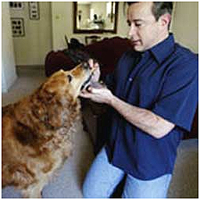
Wrigley and his owner Steven Werner.
It began with just a sniff. Whenever Steven Werner of St. Louis, MO would lie down, his Golden Retriever, Wrigley, would begin to sniff at his right ear. “I thought it was just a friendly sniff,” Werner said. “But after four or five days, I realized she seemed to be focusing on something. At some point, I noticed she was always sniffing at the opening of my right ear. She would set herself up and intently smell my ear.”
One evening, while watching television, Werner saw a television show about cancer-sniffing dogs. The puzzle of Wrigley’s sniffing began to form and Werner headed to see his doctor. He had been to see his doctor a few months previously because of occasional ringing in his ears and a feeling of uneasiness. During that visit, his doctor could not pinpoint a problem; however, during this appointment, an MRI revealed a brain tumor the size of a ping pong ball that had spread into the canal of his right ear. That was the same ear that Wrigley had been sniffing.
It was discovered that Werner had a rare non-malignant tumor called acoustic schwannoma. If the tumor had not been caught early, it could have caused a stroke or permanent facial paralysis. Werner had the tumor removed and is recovering at home with his favorite canine.
We have told many stories about the keen sense of smell that canines have. Researchers have now discovered the effectiveness of dogs detecting cancer. “A couple of preliminary studies suggest that a dog's nose is extremely sensitive at detecting certain chemicals that make up the constituents of a cancer cell," said Dr. Ted Gansler, Director of Medical Content in Health Information for the American Cancer Society. "But it's hard to know how accurate untrained dogs are."
Research suggests that cancer cells emit chemicals not found in healthy tissue. It has been discovered that certain types of solid tumors have been found to discharge compounds such as formaldehyde, benzene and alkanes. This is what is believed that Wrigley smelled in Werner’s ear.
Although a dog cannot replace biopsies and x-rays, scientists are intrigued by a dog’s scenting ability. Werner is very happy that Wrigley alerted him to the tumor and that it was caught early. “Don't get me wrong, I give credit to my doctor; she was the one who found it," he said. "But there isn't any doubt in my mind that my dog was looking out for me, that the unconditional love I gave her came back." Wrigley has not sniffed his ear since he was diagnosed.